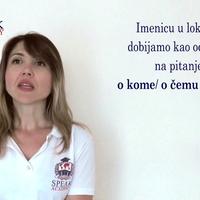Lesson 13.3 Serbian Language - Locative
Урок|Сербский|Язык|Локатив
|||Locative case
Lektion 13.3 Serbische Sprache – Lokativ
Lesson 13.3 Serbian Language - Locative
Lección 13.3 Idioma serbio - Locativo
Leçon 13.3 Langue serbe - Locative
Ders 13.3 Sırp Dili - Yer Belirleme
Урок 13.3 Сербский язык - Локатив
LOKATIV
Локатив
ЛОКАТИВ
Dom zdravlja se nalazi na levoj strani
Дом|здоровья|(глагольная частица)|находится|на|левой|стороне
Health Center|health center||||left|side
Дом здравия находится с левой стороны
Prodavnica je na uglu ulice
Магазин|есть|на|углу|улицы
The store||||
Магазин находится на углу улицы
Pasoš je u torbi
Паспорт|есть|в|сумке
The passport|||the bag
Паспорт в сумке
U navedenim primerima upotrebili smo padež mesta - lokativ
В|указанных|примерах|использовали|мы|падеж|места|локатив
|the mentioned|examples|we used||case of place||locative case
In the above examples, we used the case of place - locative
В приведенных примерах мы использовали падеж места - локатив.
Kao što mu samo ime kaže
Како|что|ему|только|имя|говорит
||to him|||says
Wie sein Name schon sagt
As his name suggests
Как само имя и говорит.
lokativ nam govori gde se nalazi subjekat
локатив|нам|говорит|где|себя|находится|субъект
|||||locates|subject
||||||sujeto
Der Lokativ sagt uns, wo das Subjekt ist
the locative tells us where the subject is
Локатив нам говорит, где находится субъект.
U ovom slučaju subjekat miruje na mestu
В|этом|случае|субъект|покоится|на|месте
||case||remains stationary||
В этом случае субъект находится на месте.
Kada upotrebimo akuzativ sa značenjem mesta subjekat se kreće
Когда|употребляем|винительный падеж|с|значением|места|субъект|(возв)|движется
|we use|accusative case||meaning||||moves
When we use the accusative with the meaning of place, the subject moves
Когда мы используем аккузатив со значением места, субъект движется.
Gde ideš?
Где|идёшь
dónde|are you going
Куда ты идёшь?
Idem u grad
Я иду|в|город
|en|ciudad
Я иду в город
idem u kafić
иду|в|кафе
||café
lo mismo|en|
Я иду в кафе
Idem na posao
Я иду|на|работу
Я иду на работу
Idem u školu
Иду|в|школу
||school
Я иду в школу
Idem na fakultet
Я иду|в|университет
||facultad
Я иду в университет
Gde se nalaziš?
Где|(возв)|находишься
||are you
|te|
Где ты находишься?
ili gde si?
или|где|ты
или где ты?
Nalazim se / ja sam u gradu
нахожусь|возвратная частица|я|есть|в|городе
I am|||||the city
Я нахожусь / я в городе
Ja sam u kafiću
Я|есть|в|кафе
|||the café
Я в кафе
Ja sam u školi
Я|есть|в|школе
Я в школе
ja sam na fakultetu
я|есть|на|факультете
|||university
Я в университете
Imenicu u kolativu dobijamo kao odgovor na pitanje O KOME / O ČEMU govoriš?
Имя существительное|в|творительном падеже|получаем|как|ответ|на|вопрос|о|ком|о|чем|говоришь
noun||locative case|we get||answer|||||||
Das Substantiv bekommen wir im Kolloquium als Antwort auf die Frage WER / WAS redest du?
We get the collative noun as an answer to the question WHO / WHAT are you talking about?
Имя существительное в коллативе мы получаем в ответ на вопрос О КОМ / О ЧЕМ ты говоришь?
O kome govoriš?
О|коме|говоришь
|about whom|
О ком ты говоришь?
Govorim o drugu
Говорю|о|друге
Ich rede von einem anderen
Я говорю о друге
Govrim o drugarici
Говорим|о|подруге
talking about||friend
Ich rede von einem Freund
Говорю о подруге
Govorim o njihvom detetu
Я говорю|о|их|ребенке
||their|child
Говорю о их ребенке
O čemu govoriš?
О|чем|говоришь
|what|
О чем ты говоришь?
Oblikom lokativa može se kazivati i vreme
Формой|локатива|может|себя|указывать|и|время
locative case|locative case|||indicate||
Die Form des Lokativs kann auch die Zeit angeben
The locative form can also be used to tell time
Формой локатива можно говорить и о времени
Ovaj oblik ne može se koristiti kada govorimo o danima u nedelji
Этот|форма|не|может|(возв)|использоваться|когда|говорим|о|днях|в|неделе
|form||||be used||||days||the week
Dieses Formular kann nicht verwendet werden, wenn es um Wochentage geht
Эта форма не может использоваться, когда мы говорим о днях недели
U novoj godini želim da ostvarim stare i postavim nove ciljeve
В|новом|году|хочу|чтобы|достигнуть|старые|и|установить|новые|цели
|new||||achieve|||set||goals
In the new year, I want to achieve old goals and set new ones
В новом году я хочу достичь старых целей и поставить новые
U prošlosti su se deca više igrala napolje
В|прошлом|(глагол-связка в прошедшем времени)|(возвратное местоимение)||больше|играли|на улице
|the past||||more|played|outside
In the past, children played more outside
В прошлом дети больше играли на улице
U septembru već prestaju velike vrućine
В|сентябре|уже|прекращаются|большие|жары
|September||cease||heat
In September, the great heat already ends.
В сентябре уже прекращаются сильные жары
Kod imenica ženskog roda u oblicima jednine, kao i kod imenica muškog roda u oblicima množine
У|существительных|женского|рода|в|формах|единственного|как|и|у|существительных|мужского|рода|в|формах|множественного
|||||forms||||||masculine (1|||plural forms|plural forms
For feminine nouns in singular forms, as well as for masculine nouns in plural forms,
У существительных женского рода в формах единственного числа, а также у существительных мужского рода в формах множественного числа
a koji se završavaju na -k -g -h ispred nastavka -i, odnosno -ima, dolazi do glasovnih promena
а|которые|(возв)|заканчиваются|на||||перед|суффикса||соответственно||происходит|до|звуковых|изменений
||||||||in front of|suffix||||it comes||vocal|changes
those ending in -k, -g, -h before the suffix -i, or -ima, undergo sound changes.
которые заканчиваются на -k -g -h перед суффиксом -и, а именно -ами, происходят звуковые изменения
SENT_CWT:AFkKFwvL=3.37 PAR_TRANS:gpt-4o-mini=2.04
ru:AFkKFwvL
openai.2025-01-22
ai_request(all=42 err=0.00%) translation(all=35 err=0.00%) cwt(all=205 err=2.93%)

